大学英语三级语法知识总结汇总
英语三级必背知识点
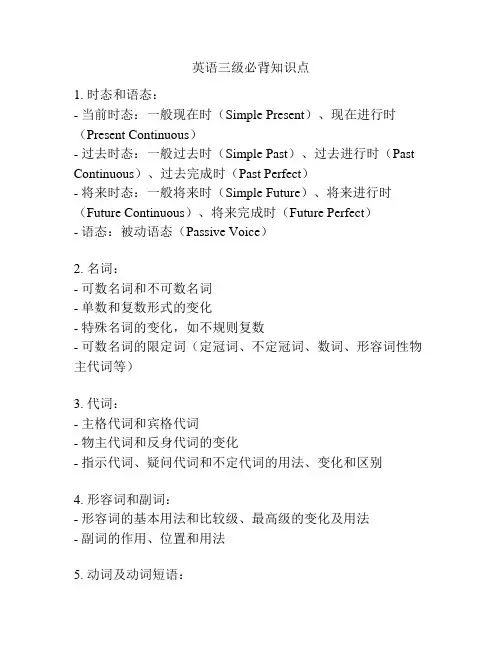
英语三级必背知识点1. 时态和语态:- 当前时态:一般现在时(Simple Present)、现在进行时(Present Continuous)- 过去时态:一般过去时(Simple Past)、过去进行时(Past Continuous)、过去完成时(Past Perfect)- 将来时态:一般将来时(Simple Future)、将来进行时(Future Continuous)、将来完成时(Future Perfect)- 语态:被动语态(Passive Voice)2. 名词:- 可数名词和不可数名词- 单数和复数形式的变化- 特殊名词的变化,如不规则复数- 可数名词的限定词(定冠词、不定冠词、数词、形容词性物主代词等)3. 代词:- 主格代词和宾格代词- 物主代词和反身代词的变化- 指示代词、疑问代词和不定代词的用法、变化和区别4. 形容词和副词:- 形容词的基本用法和比较级、最高级的变化及用法- 副词的作用、位置和用法5. 动词及动词短语:- 动词的时态、语态和形式变化- 动词短语的构成和用法,如动词+副词、动词+介词短语等6. 介词:- 常用介词的基本用法、位置和搭配- 表示时间、地点、方式、原因等不同含义的介词7. 连词:- 并列连词、从属连词和关联连词的用法及区别- 连词短语和从句的构成和用法8. 冠词:- 定冠词和不定冠词的基本用法和区别- 冠词的特殊用法,如序数词、最高级前的用法等9. 数词:- 基数词和序数词的用法和变化- 分数、小数、百分数的表达10. 句子结构:- 主谓结构、主谓宾结构、主谓表结构等基本句型- 特殊句型,如祈使句、感叹句、倒装句等11. 陈述句、疑问句、否定句、祈使句的构成和用法12. 定语从句和状语从句的基本用法和连接词的选择13. 直接引语和间接引语的变化和转换14. 复合句的标点符号和连接词的运用15. 重要的语法规则和常见的错误用法,如动词时态和语态的混淆、形容词和副词的混淆、代词和名词的混淆等。
最新大学英语三级语法知识总结汇总
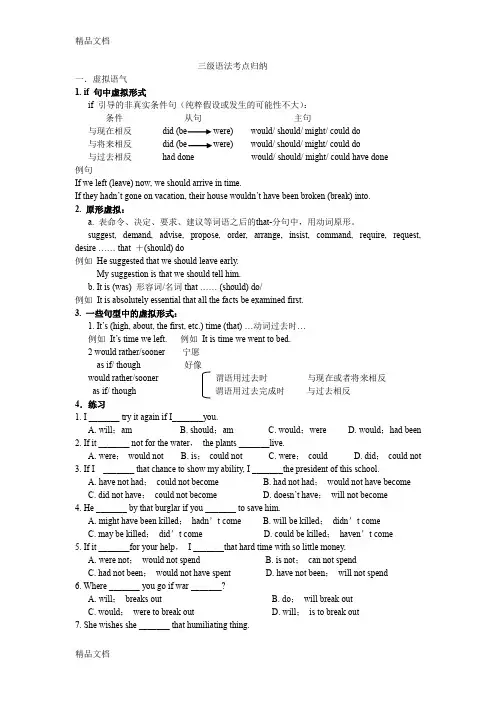
三级语法考点归纳一.虚拟语气1. if 句中虚拟形式if 引导的非真实条件句(纯粹假设或发生的可能性不大):条件从句主句与现在相反did (be were) would/ should/ might/ could do与将来相反did (be were) would/ should/ might/ could do与过去相反had done would/ should/ might/ could have done例句If we left (leave) now, we should arrive in time.If they hadn’t gone on vacation, their house wouldn’t have been broken (break) into.2. 原形虚拟:a. 表命令、决定、要求、建议等词语之后的that-分句中,用动词原形。
suggest, demand, advise, propose, order, arrange, insist, command, require, request, desire …… that +(should) do例如He suggested that we should leave early.My suggestion is that we should tell him.b. It is (was) 形容词/名词that …… (should) do/例如It is absolutely essential that all the facts be examined first.3. 一些句型中的虚拟形式:1. It’s (high, about, the first, etc.) time (that) …动词过去时…例如It’s time we left.例如It is time we went to bed.2 would rather/sooner 宁愿as if/ though 好像would rather/sooner 谓语用过去时与现在或者将来相反as if/ though 谓语用过去完成时与过去相反4.练习1. I _______ try it again if I_______you.A. will;amB. should;amC. would;wereD. would;had been2. If it _______ not for the water,the plants _______live.A. were;would notB. is;could notC. were;couldD. did;could not3. If I _______ that chance to show my ability, I _______the president of this school.A. have not had;could not becomeB. had not had;would not have becomeC. did not have;could not becomeD. doesn’t have;will not become4. He _______ by that burglar if you _______ to save him.A. might have been killed;hadn’t comeB. will be killed;didn’t comeC. may be killed;did’t comeD. could be killed;haven’t come5. If it _______for your help,I _______that hard time with so little money.A. were not;would not spendB. is not;can not spendC. had not been;would not have spentD. have not been;will not spend6. Where _______ you go if war _______?A. will;breaks outB. do;will break outC. would;were to break outD. will;is to break out7. She wishes she _______ that humiliating thing.A. doesn’t doB. didn’t doC. haven’t doneD. hadn’t done8. The chairman suggested that the meeting _______ put off.A. can beB. beC. isD. will be9. It is vital that he _______ immediately.A. should goB. must goC. goesD. went10. It is time we _______do our homework.A. begin toB. can begin toC. began toD. will begin to答案:1.选C。
大学英语教材英语三知识点总结
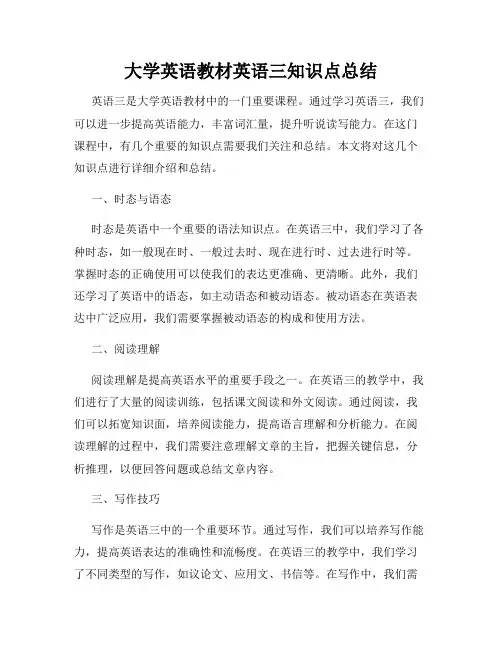
大学英语教材英语三知识点总结英语三是大学英语教材中的一门重要课程。
通过学习英语三,我们可以进一步提高英语能力,丰富词汇量,提升听说读写能力。
在这门课程中,有几个重要的知识点需要我们关注和总结。
本文将对这几个知识点进行详细介绍和总结。
一、时态与语态时态是英语中一个重要的语法知识点。
在英语三中,我们学习了各种时态,如一般现在时、一般过去时、现在进行时、过去进行时等。
掌握时态的正确使用可以使我们的表达更准确、更清晰。
此外,我们还学习了英语中的语态,如主动语态和被动语态。
被动语态在英语表达中广泛应用,我们需要掌握被动语态的构成和使用方法。
二、阅读理解阅读理解是提高英语水平的重要手段之一。
在英语三的教学中,我们进行了大量的阅读训练,包括课文阅读和外文阅读。
通过阅读,我们可以拓宽知识面,培养阅读能力,提高语言理解和分析能力。
在阅读理解的过程中,我们需要注意理解文章的主旨,把握关键信息,分析推理,以便回答问题或总结文章内容。
三、写作技巧写作是英语三中的一个重要环节。
通过写作,我们可以培养写作能力,提高英语表达的准确性和流畅度。
在英语三的教学中,我们学习了不同类型的写作,如议论文、应用文、书信等。
在写作中,我们需要掌握一些常用的写作技巧,如清晰的段落结构、连贯的语言表达、恰当的过渡词使用等。
此外,我们还需要注意语法和拼写错误,避免给读者造成困扰。
综上所述,英语三是大学英语教材中的一门重要课程。
通过学习英语三,我们可以提高时态与语态的正确使用、培养阅读理解能力和提升写作水平。
这些知识点对我们今后的学习和工作都具有重要意义。
因此,我们应该认真对待英语三的学习,不断巩固和运用所学知识,以提升自己的英语能力。
希望本文对同学们在英语三的学习中有所帮助。
大学英语三级语法详解
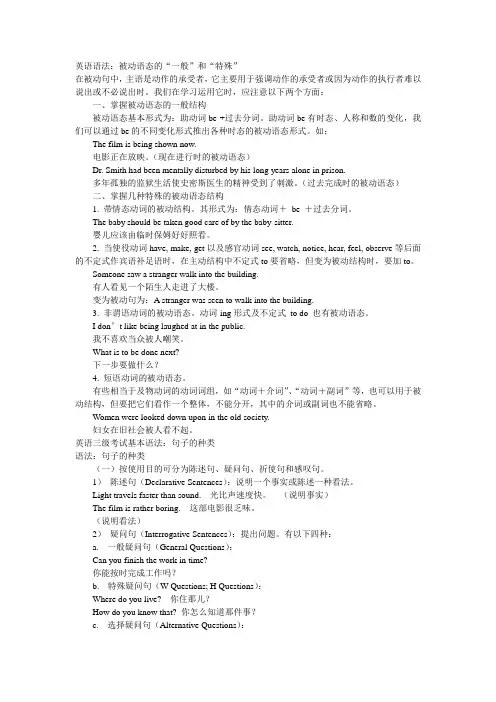
英语语法:被动语态的“一般”和“特殊”在被动句中,主语是动作的承受者,它主要用于强调动作的承受者或因为动作的执行者难以说出或不必说出时。
我们在学习运用它时,应注意以下两个方面:一、掌握被动语态的一般结构被动语态基本形式为:助动词be +过去分词。
助动词be有时态、人称和数的变化,我们可以通过be的不同变化形式推出各种时态的被动语态形式。
如:The film is being shown now.电影正在放映。
(现在进行时的被动语态)Dr. Smith had been mentally disturbed by his long years alone in prison.多年孤独的监狱生活使史密斯医生的精神受到了刺激。
(过去完成时的被动语态)二、掌握几种特殊的被动语态结构1. 带情态动词的被动结构。
其形式为:情态动词+be +过去分词。
The baby should be taken good care of by the baby-sitter.婴儿应该由临时保姆好好照看。
2. 当使役动词have, make, get以及感官动词see, watch, notice, hear, feel, observe等后面的不定式作宾语补足语时,在主动结构中不定式to要省略,但变为被动结构时,要加to。
Someone saw a stranger walk into the building.有人看见一个陌生人走进了大楼。
变为被动句为:A stranger was seen to walk into the building.3. 非谓语动词的被动语态。
动词-ing形式及不定式to do 也有被动语态。
I don’t like being laughed at in the public.我不喜欢当众被人嘲笑。
What is to be done next?下一步要做什么?4. 短语动词的被动语态。
有些相当于及物动词的动词词组,如“动词+介词”、“动词+副词”等,也可以用于被动结构,但要把它们看作一个整体,不能分开,其中的介词或副词也不能省略。
大学英语三级考试语法复习要点总结
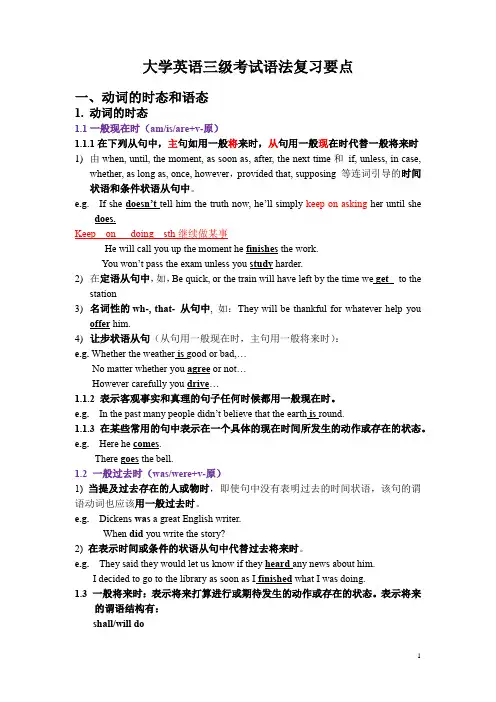
大学英语三级考试语法复习要点一、动词的时态和语态1. 动词的时态1.1一般现在时(am/is/are+v-原)1.1.1在下列从句中,主句如用一般将来时,从句用一般现在时代替一般将来时1)由when, until, the moment, as soon as, after, the next time和if, unless, in case,whether, as long as, once, however,provided that, supposing 等连词引导的时间状语和条件状语从句中。
e.g. If she doesn’t tell him the truth now, he’ll simply keep on asking her until shedoes.Keep on doing sth继续做某事He will call you up the moment he finishes the work.You won’t pass the exam unless you study harder.2)在定语从句中,如,Be quick, or the train will have left by the time we get to thestation3)名词性的wh-, that-从句中, 如:They will be thankful for whatever help youoffer him.4)让步状语从句(从句用一般现在时,主句用一般将来时):e.g. Whether the weather is good or bad,…No matter whether you agree or not…However carefully you drive…1.1.2 表示客观事实和真理的句子任何时候都用一般现在时。
e.g.In the past many people didn’t believe that the earth is round.1.1.3 在某些常用的句中表示在一个具体的现在时间所发生的动作或存在的状态。
英语三级复习整理资料
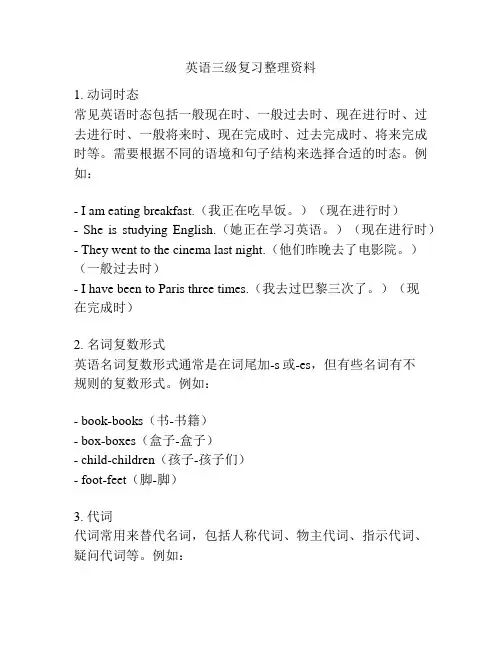
英语三级复习整理资料1. 动词时态常见英语时态包括一般现在时、一般过去时、现在进行时、过去进行时、一般将来时、现在完成时、过去完成时、将来完成时等。
需要根据不同的语境和句子结构来选择合适的时态。
例如:- I am eating breakfast.(我正在吃早饭。
)(现在进行时)- She is studying English.(她正在学习英语。
)(现在进行时)- They went to the cinema last night.(他们昨晚去了电影院。
)(一般过去时)- I have been to Paris three times.(我去过巴黎三次了。
)(现在完成时)2. 名词复数形式英语名词复数形式通常是在词尾加-s或-es,但有些名词有不规则的复数形式。
例如:- book-books(书-书籍)- box-boxes(盒子-盒子)- child-children(孩子-孩子们)- foot-feet(脚-脚)3. 代词代词常用来替代名词,包括人称代词、物主代词、指示代词、疑问代词等。
例如:- He is my friend. I like him.(他是我的朋友。
我喜欢他。
)(人称代词)- This is my book. That is your book.(这是我的书。
那是你的书。
)(指示代词)- Whose bag is this?(这是谁的书包?)(疑问代词)4. 副词副词常用来修饰动词、形容词或其他副词,表示程度、方式、时间等。
常见的副词有常规变化规律的副词和不规则的副词。
例如:- The dog runs quickly.(这只狗跑得很快。
)(常规变化规律的副词)- The boy sings beautifully.(这个男孩唱得很好听。
)(常规变化规律的副词)- He speaks English well.(他英语讲得很好。
)(不规则副词)5. 形容词形容词可以描述名词或代词的特征或性质,一般放在名词前面。
大学英语三级语法大全
大学英语三级语法大全名词性从句概述名词性从句在句子中起名词作用的句子叫名词从句 (Noun Clauses)。
名词从句的功能相当于名词词组, 它在复合句中能担任主语、宾语、表语、同位语、介词宾语等,因此根据它在句中不同的语法功能,名词从句又可分别称为主语从句、宾语从句、表语从句和同位语从句。
引导名词性从句的连接词引导名词性从句的连接词引导名词性从句的连接词可分为三类:连接词:that, whether, if(不充当从句的任何成分)连接代词:what, whatever, who, whoever, whom, whose, which.连接副词:when, where, how, why不可省略的连词:1. 介词后的连词2. 引导主语从句和同位语从句的连词不可省略。
What she was chosen made us very happy.We heard the news that our team had won.比较:whether与if 均为"是否"的意思。
但在下列情况下,whether 不能被if 取代:1. whether引导主语从句并在句首2. 引导表语从句3. whether从句作介词宾语4. 从句后有"or not"Whether he will come is not clear.大部分连接词引导的主语从句都可以置于句末,用 it充当形式主语。
It is not important who will go.It is still unknown which team will win the match.名词性wh-从句名词性wh-从句1)由wh-词引导的名词从句叫做名词性wh-从句。
Wh-词包括who, whom,. whose, whoever, what, whatever, which, whichever等连接代词和where, when, how, why等连接副词。
英语三级考试复习资料
英语三级考试复习资料一、词汇篇1. 核心词汇积累(1)高频词汇:掌握《大学英语三级词汇表》中的核心词汇,这部分词汇在考试中出现的频率较高。
(2)词组搭配:学习常见词组的用法,如“be interested in”、“look forward to”等。
(3)近义词辨析:了解近义词之间的区别,如“like”和“love”、“enjoy”和“appreciate”等。
2. 词汇记忆技巧(1)联想记忆:通过词根、词缀、发音等方面的联想,提高记忆效果。
(2)语境记忆:将单词放入具体语境中,通过例句来加深印象。
(3)循环复习:遵循艾宾浩斯遗忘曲线,定期复习已学词汇。
二、语法篇1. 基础语法知识(1)动词时态:熟练掌握一般现在时、一般过去时、一般将来时等基本时态。
(2)名词单复数:了解名词单复数的变化规则,尤其是不规则变化。
(3)主谓一致:掌握主谓一致的原则,如就近原则、就远原则等。
(4)定语从句:学会使用关系代词和关系副词引导定语从句。
2. 高级语法知识(1)非谓语动词:掌握动名词、分词和不定式作状语、定语等用法。
(2)虚拟语气:了解虚拟语气在条件句、宾语从句等句子中的运用。
(3)倒装句:掌握部分倒装和完全倒装的用法。
三、阅读篇1. 阅读技巧(1)快速浏览:通过、小、首尾段等快速了解文章大意。
(2)精读细节:针对题目,仔细阅读相关段落,找出关键信息。
(3)推断词义:根据上下文,推断生词或短语的意义。
2. 阅读题型攻略(1)事实细节题:关注文章中的具体信息,如时间、地点、人物等。
(2)推理判断题:根据文章内容,进行合理推断。
(3)主旨大意题:把握文章主题,概括文章大意。
四、写作篇1. 写作技巧(1)明确题目要求:认真审题,确保文章内容符合题目要求。
(2)结构清晰:遵循“引言结尾”的结构,使文章条理分明。
(3)丰富表达:运用多样的句式和词汇,提高文章质量。
2. 常见写作题型攻略(1)书信:熟悉书信格式,掌握各类书信的写作要点。
英语三级知识点范文
英语三级知识点范文
1.语法知识:
-动词时态和语态:一般现在时、一般过去时、一般将来时、过去进行时、过去完成时、被动语态等。
-词类和词性:名词、动词、形容词、副词、代词、冠词、介词、连词等。
-句型结构:主谓结构、主系表结构、并列句、复合句、倒装句等。
-时态和语态的转换:将来时的转换、虚拟语气等。
2.词汇知识:
-常见词汇:相关常见词汇,包括名词、动词、形容词、副词等。
-习惯用语和固定搭配:固定搭配、常用短语和习惯用语的掌握。
-同义词和近义词辨析:近义词和同义词的辨析和使用。
-词根词缀:词根和词缀的用法和意义。
3.阅读理解:
-短文理解:阅读并理解短文,回答问题或完成相关任务。
-阅读策略:推测上下文意思、寻找关键词等阅读策略。
-阅读速度控制:掌握阅读速度,提高阅读效率。
4.听力技巧:
-主旨概括:通过听力材料,概括出主要内容。
-细节理解:听取细节信息,回答相关问题。
-对话场景判断:根据对话内容,判断场景和人物关系。
-短文完形填空:根据短文内容,选择正确的选项。
5.口语表达:
-日常交际用语:问候、介绍自己、提出请求、道歉、感谢、邀请等常见交际用语。
-自我介绍:掌握简单自我介绍的表达方式。
-问答对话:回答与问题相匹配的内容,进行对话交流。
-完成任务:按要求进行任务表达,如描述图片、演讲等。
6.写作技巧:
-信件写作:写推荐信、道歉信、感谢信、邀请信等。
-短文写作:写文章、记叙文、说明文等。
-日记写作:根据给定的时间和话题,进行日记写作。
全国公共英语三级常见语法
第一节动词的时态一、一般现在时:1、由when、as soon as、the minute、the moment、till、until等引起的时间状语从句,以及由if、unless、provided that等引起的条件状语从句常常用一般现在时态表示将来的动作,而主句则用一般将来时态。
例:They will go home for winter vocation as soon as they finish their exams。
2、当表示普遍的真理或者众所周知的客观事实,常常用一般现在时态。
例:The earth is round。
地球是圆的.二、一般过去时:区分三个短语的用法:1、used to do sth:过去常常做某事。
2、be/get used to doing sth:习惯做某事。
3、be used to do sth:被用于做某事.三、一般将来时:1、be to+动词原形:表示安排或计划好了的动作。
例:The Third-Ring Road is to be open to traffic before National Day.2、be about to+动词原形:表示即将发生的动作。
例:The lecture is about to begin。
讲座即将开始。
3、一些表示动作趋势,如开始、终结,以及一些表示动作方向,如往来的动词,常常用现在进行时态表示按照安排将于将来发生的事情,这类动词常见的有如:start,go,leave,come,arrive等.例:We are leaving for Beijing tomorrow. 我们明天动身去北京。
四、进行时态:重点区分when和while引起的时间状语的用法。
When表示时间上的点,在考试中其引导的时间状语从句多翻译为“这时?”,主句多用进行时态;while引导的时间状语从句多翻译为“正当……时”,该从句用进行时态. 例:One of the guards was sleeping when the general came in, which made him very angry。
- 1、下载文档前请自行甄别文档内容的完整性,平台不提供额外的编辑、内容补充、找答案等附加服务。
- 2、"仅部分预览"的文档,不可在线预览部分如存在完整性等问题,可反馈申请退款(可完整预览的文档不适用该条件!)。
- 3、如文档侵犯您的权益,请联系客服反馈,我们会尽快为您处理(人工客服工作时间:9:00-18:30)。
三级语法考点归纳一.虚拟语气1. if 句中虚拟形式if 引导的非真实条件句(纯粹假设或发生的可能性不大):条件从句主句与现在相反did (be were) would/ should/ might/ could do 与将来相反did (be were) would/ should/ might/ could do 与过去相反had done would/ should/ might/ could have done例句If we left (leave) now, we should arrive in time.-If they hadn’t gone on vacation, their house wouldn’t have been broken (break) into.2. 原形虚拟:a. 表命令、决定、要求、建议等词语之后的that-分句中,用动词原形。
suggest, demand, advise, propose, order, arrange, insist, command, require, request, desire …… that +(should) do例如He suggested that we should leave early.My suggestion is that we should tell him.b. It is (was) 形容词/名词that …… (should) do/例如It is absolutely essential that all the facts be examined first.3. 一些句型中的虚拟形式:1. It’s (high, about, the first, etc.) time (that) …动词过去时…)例如It’s time we left.例如It is time we went to bed.2 would rather/sooner 宁愿as if/ though 好像would rather/sooner 谓语用过去时与现在或者将来相反as if/ though 谓语用过去完成时与过去相反4.练习1. I _______ try it again if I_______you.A. will;amB. should;amC. would;wereD. would;had been2. If it _______ not for the water,the plants _______live.A. were;would notB. is;could notC. were;couldD. did;could not¥3. If I _______ that chance to show my ability, I _______the president of this school.A. have not had;could not becomeB. had not had;would not have becomeC. did not have;could not becomeD. doesn’t have;will not become4. He _______ by that burglar if you _______ to save him.A. might have been killed;hadn’t comeB. will be killed;didn’t comeC. may be killed;did’t comeD. could be killed;haven’t come5. If it _______for your help,I _______that hard time with so little money.A. were not;would not spendB. is not;can not spendC. had not been;would not have spentD. have not been;will not spend6. Where _______ you go if war _______>A. will;breaks outB. do;will break outC. would;were to break outD. will;is to break out7. She wishes she _______ that humiliating thing.A. doesn’t doB. didn’t doC. haven’t doneD. hadn’t done8. The chairman suggested that the meeting _______ put off.A. can beB. beC. isD. will be9. It is vital that he _______ immediately.A. should goB. must goC. goesD. went10. It is time we _______do our homework.A. begin toB. can begin toC. began toD. will begin to·答案:1.选C。
表示与现在事实相反的假设(指现在的假设) (译文; 如果我是你,我会再试一次)2选A。
表示与现在事实相反的假设(指现在的假设)。
(译文:要是没有水,植物就不能存活。
)3. 选B。
表示与过去事实相反的假设。
4 A。
表示与过去事实相反的假设。
(译文:要不是你来救他,他早就被那个窃贼杀了。
)5. C。
与过去事实相反的假设。
(译:要没有你帮忙,我那点儿钱是无法度过那段艰苦岁月的。
)6.选C。
表示与将来事实相反的假设。
(译文:要是战争爆发了,你会上哪儿去)7.选D。
虚拟语气用于宾语从句。
(译文:她真希望自己没有做过那件丢脸的事情。
)8. 选B。
虚拟语气用于表示“建议”等意义的动词后。
(译文:主席建议会议延期举行。
)9. 选A。
虚拟语气用于主语从句(It is /was + 形容词+ that 引导的分句)。
:10. 选C。
虚拟语气用于定语从句It is time (that)...句型。
(译文:我们该开始做作业了。
)二.动词的时态2. 时间状语与动词时态的搭配一定的时态往往和一定的时间状语连用。
always ,usually, sometimes, 一般现在时do/does am is are;last week, yesterday, a few days ago 一般过去时did was/ werenext week, tomorrow, in a week, this year 一般将来时will donow, at present, at this moment 现在进行时be +doingso far, up to now, by the time, since的主句现在完成时has/have done3. 练习,用动词的适当形式填空1. He _______ (be) eighteen next year.2. It _______ (rain) every day so far this month.3. Mozart _______ (write) more than 600 pieces of music.4. If it _______ (rain) tomorrow,we’ll have to stay at home.5. How fast _______ he _______ (drive) when the accident happened~6. By the time Mr. Smith left school,he _______ (teach) that course for twenty-fiveyears.7. Perhaps he _______ (finish) reading the book by this time tomorrow.1. 填will be。
next year为表示将来时态的时间状语2. 填has rained。
so far是“到目前为止”的意思,常和现在完成时搭配使用。
3. 填wrote。
Mozart (莫扎特)是已去世的音乐家,故应使用过去时。
4. 填rains。
在条件状语从句中,要用一般现在时表示将来发生的事情。
5. 填was...driving。
表示过去某一时刻发生的动作要用过去进行时。
6. 填had taught。
句中有by the time Mr. Smith left school,主语的谓语应用过去完成时。
7. 填will have finished。
句中有by this time tomorrow,主语的谓语应用将来完成时。
!三动词的被动语态1. The construction of the library_______ before the end of next month.A. must have completedB. must have been completedC. must be completedD. must complete2. The subject of these lectures _______ by the lecture committee.A. announcesB. have been announcedC. announcedD. has been announced3. My pictures _______ until next week.;A. won’t developB. aren’t developingC. don’t developD. won’t be developed4. They _______ so that we wouldn’t recognize them.A. costumedB. disguisedC. were disguisingdisguised5. All the apparatus (器械) _______ before the experiment began.A. had been preparedB. were preparedC. had been preparedD. had prepared6. The world’s supplies of copper _______ .A. have been gradually being exhaustedB. has gradually exhaustedC. are gradually exhaustedD. are being gradually exhausted7. The goods _______ when we arrived at the airport.;A. were just unloadingB. were just being unloadedC. had just unloadedD. were just been unloaded8. Tom _______ the best student in his class.A. regardsB. regards asC. has regarded asD. is regarded as9. The sports meeting _______ because of the bad weather.A. put offB. was put offC. was putted offD. has put off1. C。
